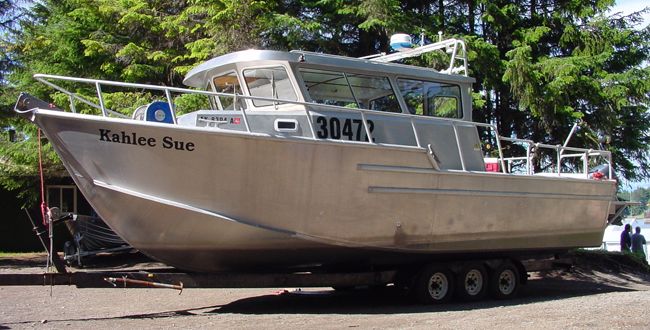Marine Aluminum Plate For Hull
Marine aluminum plate for hull has properties such as high strength and corrosion resistance, so it is commonly used for ship hull fabrication. Aluminum plates used to make ship hulls are available in a variety of alloys and states. The main types of aluminum alloys include the Al-Mg system aluminum alloys 5083 aluminum plate, 5086 aluminum plate, 5754 aluminum plate, 5052 aluminum plate and 6061 aluminum plate with good forming and processing performance, corrosion resistance, weldability, medium strength. At the same time, each of these marine grade aluminum alloys has its own characteristics and is suitable for the needs of different parts of the hull.
Taking 5083 marine aluminum plate for hull as an example, it is one of the commonly used alloys in the manufacture of ship hulls. 5083 marine aluminum plate has high strength, excellent corrosion resistance, as well as good cold and hot forming properties, which makes it very suitable for the manufacture of ship hulls. This marine aluminum plate is usually used in H116, H321, and H112 states, which represent the way the sheet is processed and heat-treated to ensure that it has the required physical and mechanical properties. In addition to 5083 aluminum plate, other alloys such as 5086 aluminum plate and 5754 aluminum plate are also used in hull fabrication due to their unique properties. For example, 5086 aluminum sheet also has excellent corrosion resistance and is suitable for parts such as hulls and topsides.

With regards to the thickness of the marine aluminum plate for hull, this largely depends on the size of the hull, its purpose, and the loads it needs to carry. Generally speaking, smaller boats may have thinner aluminum panels, while larger boats or boats that are subject to high loads may require thicker aluminum panels. For example, a ten-meter aluminum boat usually has aluminum plate thicknesses between 3 and 6 millimeters. If the boat is mainly used for recreation, light loads and coastal sailing, then an aluminum plate of around 3 mm may be sufficient. For boats that need to cope with complex sea conditions and strength, aluminum alloys with a thickness of 4 to 5 mm are recommended. For vessels facing huge waves and heavy loads, then aluminum alloy materials of 6 mm or thicker may be required.
In terms of quality requirements, marine aluminum plates need to meet a series of standards and specifications, including but not limited to the chemical composition, mechanical properties, dimensional accuracy, surface quality and other aspects of the material. Marine aluminum plate also needs to undergo strict inspection during the production process to ensure that its quality meets the relevant standards. Meanwhile, for different kinds of aluminum alloy plates, their quality requirements will be different, and they need to be selected and inspected according to specific application scenarios and needs.
Please note that the specific alloy selection, thickness and quality requirements need to be considered based on factors such as the specific design of the hull, the purpose, the load and the environment in which it will be used. In addition to the alloy type, the condition of the marine aluminum plate for hull, i.e. what kind of processing and heat treatment it has undergone, also needs to be considered. Different states will affect the physical properties, mechanical properties and processing performance of the marine aluminum plate, so it is necessary to select the appropriate state of marine grade aluminum plate according to the specific needs of the hull and manufacturing process. When choosing marine aluminum plates for ships, it is recommended to consult a professional material engineer or ship designer to ensure that the selected material can meet the needs of the ship's hull.








